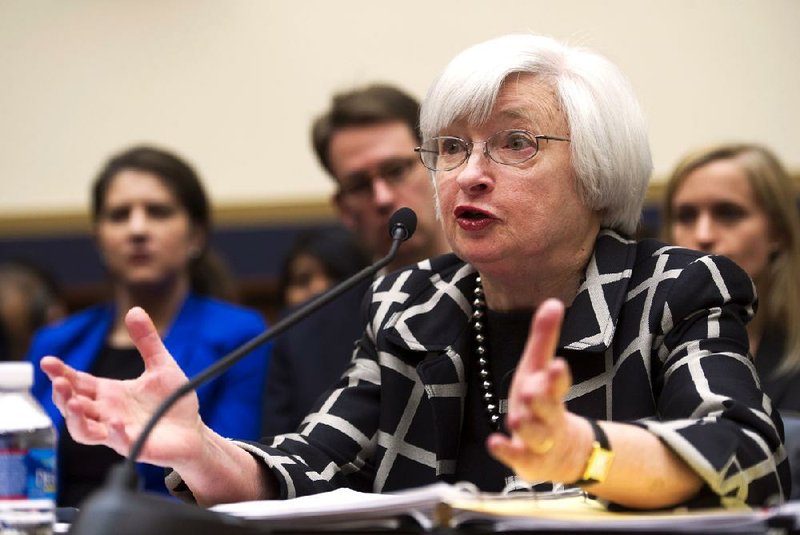WASHINGTON - Federal Reserve Chairman Janet Yellen told Congress on Tuesday that the central bank maintained its optimistic view of the economy and its determination to retreat slowly from its stimulus campaign.
Yellen’s first public remarks as chairman were hard to distinguish from the final public remarks of her predecessor, Ben Bernanke. She told members of the House Financial Services Committee that she was not seeking to change the Fed’s course.
“I expect a great deal of continuity,” said Yellen, who was most recently the Fed’s vice chairman. Referring to the Federal Open Market Committee, which sets monetary policy, she said, “I served on the committee as we formulated our current policy strategy, and I strongly support that strategy.”
Yellen reiterated the Fed’s optimistic assessment that economic growth would strengthen this year, and said the central bank would continue to cut back its monthly bond purchases unless there was a “notable change” in the economic outlook.
Stocks climbed after the hearing. The Dow Jones industrial average rose 192.98 points, or 1.2 percent, to 15,994.77.
“Her message was continuity of policy and, matching that with continuity of outlook, suggests [the Fed remains] on the same course,” said Keith Hembre, a former Minneapolis Fed researcher who helps oversee $125 billion as chief economist at Nuveen Asset Management LLC in Minneapolis.
Some Republican lawmakers told Yellen of their concerns that the Fed’s extraordinary support could eventually create high inflation or destabilize financial markets.
The committee chairman, Jeb Hensarling, R-Texas, a critic of the Fed, said there were “clearly limits to what monetary policy can achieve.” Hensarling questioned whether the Fed had sent confusing signals to investors by changing its possible timetable for future actions on interest rates.
Rep. Carolyn Maloney, DN.Y., asked Yellen to explain what developments might cause the Fed to slow or suspend its reductions in bond purchases. Maloney asked whether the weak job reports for December and January might prompt such a pause.
Yellen said she was surprised by the sluggish job gains the past two months. But she cautioned against “jumping to conclusions.” She suggested that job growth might have been held down by winter weather and was not necessarily a signal of a hiring slowdown. She noted that when the Fed next meets to consider interest rates March 18-19, it will have another employment report to review.
After expanding its holdings of Treasury and mortgage backed securities by $85 billion each month last year, the Fed reduced the monthly pace to $75 billion in January and to $65 billion in February. Yellen affirmed that another reduction was likely at the Fed’s March meeting.
She also emphasized that the recovery of the labor market was “far from complete.” In particular, Yellen said she continued to regard the low level of employment as a problem that monetary policy had the power to improve, rejecting the idea that demographic factors, such as an aging population, were solely responsible.
“I am inclined to believe myself based on the evidence that there are also cyclical factors at work,” she said.
Yellen also highlighted the Fed’s regulatory responsibilities, saying, “The work of making the financial system more robust has not yet been completed.”
Yellen repeated the Fed’s view that the economy is getting better.
“The economic recovery gained greater traction in the second half of last year,” she said, citing the growth of spending by consumers and businesses. She said the Fed continued to expect “that economic activity and unemployment will expand at a moderate pace this year and next.”
Yellen also downplayed concerns about turbulence in emerging markets such as Turkey.
“We have been watching closely the recent volatility in global financial markets,” she said. “Our sense is that at this stage these developments do not pose a substantial risk to the U.S. economic outlook.”
The central bank said in 2012 that it planned to keep short-term interest rates near zero at least as long as the unemployment rate remained above 6.5 percent. It has since said that it was most likely to maintain that policy well past that threshold. But with the unemployment rate reaching 6.6 percent in January, a number of Fed officials have said there is a need for greater clarity about its plans.
Yellen will answer questions before a Senate committee Thursday. The Fed reports to Congress twice a year about its conduct of monetary policy. Information for this article was contributed by Binyamin Appelbaum of The New York Times, Joshua Zumbrun and Jeff Kearns of Bloomberg News Martin Crutsinger of The Associated Press.
Business, Pages 25 on 02/12/2014

